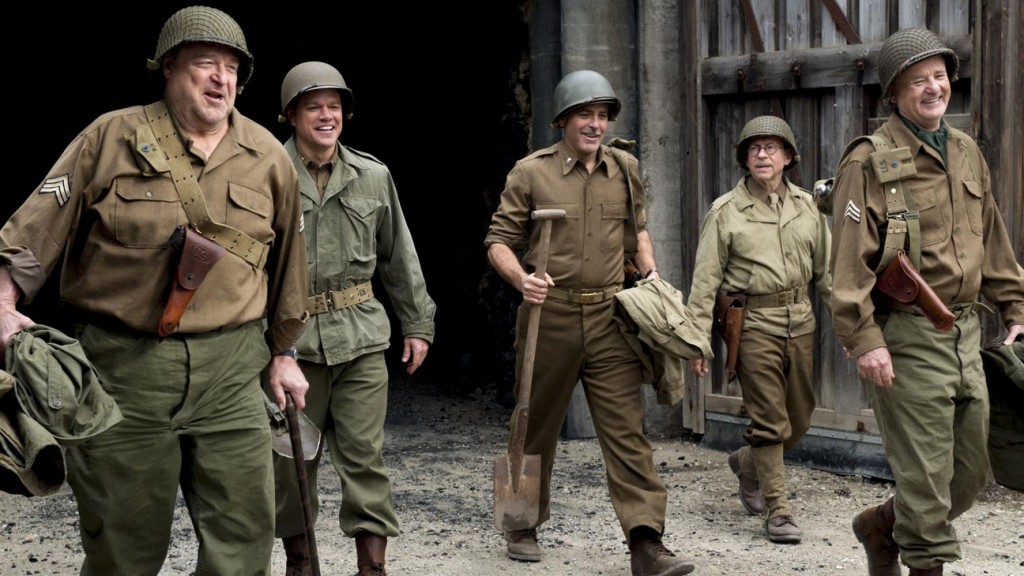Reviews
Movie review: “The Monuments Men”

The Monuments Men
dir. George Clooney
Release Date: Feb 07, 14
- 1
- 2
- 3
- 4
- 5
- 6
- 7
- 8
- 9
- 10
It’s 1944. World War II is drawing to a close, and the Allied forces are tightening the noose around Hitler. Lt. Frank Stokes (George Clooney) worries about one unsung facet of Hitler’s reign of terror: the wholesale abduction of major works of art from conquered territories. Arguing that the destruction of the great early works would be tantamount to the destruction of entire civilizations, Stokes is allowed to assemble a crew of artists and scholars to enter German-occupied territories and reclaim the lost works. Along the way, lives are lost, lessons are learned, flirtations ensue, and for just shy of two hours Clooney makes an earnest attempt to revive a kind of cinema that’s long since fallen out of fashion.
The Monuments Men is hardly the prestige picture many people will expect. It’s not much of an Oscar movie at all, frankly, if “Oscar movie” is something we can use to describe a film with genre. (The existence of The Reader argues that it is indeed, but that’s another debate for another time.) Clooney’s latest directorial effort, to good ends and bad alike, is styled as a throwback to the adventure capers of 1930s/40s wartime cinema, in which a ragtag group of unlikely heroes embark on an idealistic quest in which they’re seemingly outmatched by overwhelming forces of evil. The good guys are good, the bad guys are bad, the women are molls, and the film is far more reliant on movie star power than actual compelling filmmaking. And yet, given Clooney’s status as perhaps the last of the traditional movie stars, it sometimes works better than it really should.
Though the film takes certain liberties with history, starting with the part where the Monuments Men were actually hundreds of people around the world involved in the effort and not simply one platoon, The Monuments Men isn’t necessarily focused on accuracy. Its biggest problem, in fact, is that its focus never stays in any one place for any length of time. Each character is allowed one quirk that buoys their part of the story: there’s the French one (Jean Dujardin), the disgraced Englishman (Hugh Bonneville), the roguishly charming American (Matt Damon), the quippy one (Bill Murray), the gentle giant (John Goodman), the nerd (Bob Balaban) and the kid (Dimitri Leonidas). And then there’s Clooney, who’s the one who can see all the angles all the time. The characterization never gets any deeper than the above, and it’s to the film’s detriment. On the multiple occasions when the peril takes a turn for the mortal, it feels more like a requisite war movie beat than a genuinely emotional moment.
Like the films of yore that Clooney clearly seeks to emulate, The Monuments Men knows that its real strength is not in the narrative, which is a repetitive cycle of scene-setting exposition followed by a joke or two to button each scene before moving on. It’s in the glamour of the star power, evidenced best by a playfully terse dinner date between Damon’s married lieutenant and Cate Blanchett’s skeptical, guarded Parisian museum archivist. It’s not a particularly good thing that the best moments in The Monuments Men are the ones in which the movie steps away from its own plot, but watching Blanchett and Damon tease one another with the prospect of a love that both know can never flower proves considerably more interesting than a series of dry discussions about roving military caravans or secretive Russian raid squads.
That’s the thing about The Monuments Men. It’s occasionally diverting, but inconsistent. Every once in a while the film finds a sense of urgency, only to ultimately move on from it. There are intermittent moments of astute filmmaking, particularly a film-best Christmas sequence in which the death of a faceless young soldier is juxtaposed with one of Murray’s children singing “Have Yourself a Merry Little Christmas.” More often, though, the film pays far more attention to quippy one-liners and endless exposition (seriously, there’s so damn much of it) instead of making the bookish Magnificent Seven it appears to be leaning into. The Monuments Men isn’t a total disaster, but in its earnest pursuit of an old-time ideal, it ends up turning into the sort of perfunctory studio picture that time left behind.